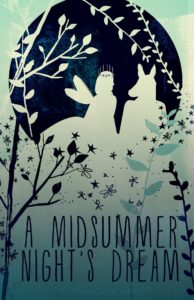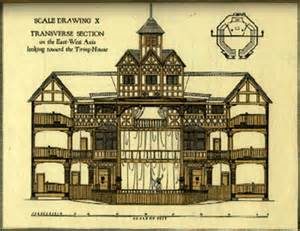

One hour into the performance, magic has transformed the audience as well. They scarcely notice when the light crew (on the roof) cover their equipment with a tarp to keep off the rain. The wind quickens, thunder rolls, umbrellas pop open in the seating area. But nobody leaves—gradually the players realize that nobody wants to leave. Helena (otherwise known as me) enters, wailing, “O weary night,” and the line becomes a shared joke. By the time the four lovers curl up on the ground our stage is definitely soggy, but the clouds at least wait for a scene change to do their worst.
Audience and cast members make a break for the lobby, dripping wet, and set up chairs—quickly, before the spell is broken. By now every mom and dad and little brother is a member of Duke Theseus’ wedding party; we are all audience, we are all players. The fractured performance of “Pyramus and Thisbe” was never more hilarious. Amateurism is a positive asset. An amazing thing has happened: the play has adapted itself to us and our circumstances, and become A Midsummer Night’s Dream like no other.
It wasn’t my first experience with Shakespeare. About eight years before, my older sister and I had staged a production of Julius Caesar in our back yard with the neighborhood kids. It was her idea: she was going through a phase of Roman enthusiasm back then, but as a future English major she was always in a Shakespeare enthusiasm. We wrote our own script, but the outline was Shakespeare’s version and a lot of the lines were his, too: “a lean and hungry look,” “There is a tide,” “Friends! Romans! Countrymen! Lend me your ears!” The lines we wrote I forgot long ago. The bard’s lines are still in my head.
The great value of Shakespeare, I think, is that he’s so endlessly adaptable. He left no stage 

A reader may be convinced of all this, and still crash against the solid wall of his Elizabethan vocabulary and phrasing. There are 21st century barriers to studying a 16th century poet, but the greatest may be fear. The man has been around for over 400 years; his language is difficult, his scholarship is massive, his reputation is big and scary. But he himself would probably be surprised to know that he’s the terror of high school literature classes. His world was rushed, frantic, exhilarating, and constantly improvised. He left so much undone—or, to see it another way, he left so much for us to do. Don’t be afraid of him. Shakespeare is one of the very few writers who can be appreciated apart from his worldview, because that worldview is notoriously difficult to pin down. Christians, pagans, hedonists, stoics and cynics all claim him, with more or less justification. But he never fully belonged to any of them. Instead he belongs to all.
So how to approach Shakespeare? In my opinion, in the spirit of a 16th century theater audience, free to criticize and provide their own interpretation and throw rotten vegetables. Elizabethan theater was interactive, to put it mildly, and so is Shakespeare; he invites collaboration. As to just how to do that, I have some ideas on my website. For teachers, go here for reasons why and tips on how—many of the activities are written with a classroom in mind but can be adapted to home school or learning co-op. For teens, a list of reasons and suggestions is here. (The tip for guys to “brush up their Shakespeare” is meant to be tongue in cheek. Mostly.) Finally, a list of movies of Shakespeare plays or based on Shakespeare plays, all screened by me except when I indicate otherwise. (Unfortunately, some the more recent movies like to throw in gratuitous nudity so you might want to check them out first.)
Reading and exploring Shakespeare can be a lifetime occupation, but even a passing acquaintance with him can be well worth your while.
Stay Up to Date!
Get the information you need to make wise choices about books for your children and teens.
Our weekly newsletter includes our latest reviews, related links from around the web, a featured book list, book trivia, and more. We never sell your information. You may unsubscribe at any time.
Support our writers and help keep Redeemed Reader ad-free by joining the Redeemed Reader Fellowship.
Stay Up to Date!
Get the information you need to make wise choices about books for your children and teens.
Our weekly newsletter includes our latest reviews, related links from around the web, a featured book list, book trivia, and more. We never sell your information. You may unsubscribe at any time.
FREE Bible Guide!
Get a guide to the Best Bibles for Children and Teens. Perfect for an Easter gift.
We'd love to hear from you!
Our comments are now limited to our members (both Silver and Golden Key). Members, you just need to log in with your normal log-in credentials!
Not a member yet? You can join the Silver Key ($2.99/month) for a free 2-week trial. Cancel at any time. Find out more about membership here.
2 Comments
Leave a Comment
You must be logged in to post a comment.


So, we are to believe you were involved with thespians without losing your Christianity? ha. But seriously, as a mom of a theatrically-inclined daughter, I’m kind of interested in how or when that might be a beneficial thing to do.
So, we are to believe you were involved with thespians without losing your Christianity? ha. But seriously, as a mom of a theatrically-inclined daughter, I’m kind of interested in how or when that might be a beneficial thing to do.